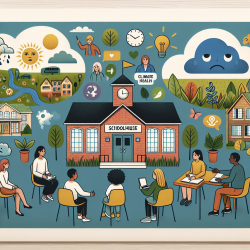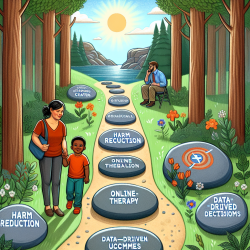The intersection of climate change and mental health is a rapidly growing field of study. As educators and practitioners, it's crucial to stay informed about the latest developments and integrate this knowledge into our curricula. The research article "Climate Change and Mental Health Curricula: Addressing Barriers to Teaching" offers valuable insights into overcoming the challenges of incorporating climate change education into mental health curricula.
Understanding the Barriers
The research identifies several barriers that educators face when designing curricula that address climate change and mental health. These include:
- Cognitive Bias: Many individuals struggle to perceive the urgency of climate change due to its abstract nature. This can lead to inaction.
- Climate-Related Anxiety: Also known as eco-anxiety, this is the chronic fear of environmental cataclysms, which can paralyze individuals and communities.
- Lack of Facility with Climate Science Methods: The vast amount of scientific literature on climate change can be overwhelming, especially for those unfamiliar with the methods used in climate science.
- Lack of Local Experts: There are few mental health experts specializing in climate change, making it challenging for educators to find resources and support.
- Insufficient Curriculum Space: Integrating new topics into existing curricula can be difficult due to limited time and resources.
- Lack of Evaluation Data: With few established indicators for measuring the success of climate health education, evaluating curricula can be challenging.
Proposed Solutions
The article proposes several solutions to these barriers, encouraging educators to take proactive steps in integrating climate change education into their curricula:
- Create a Sense of Urgency: Use case vignettes and personal stories to make the impact of climate change more tangible for students without overwhelming them.
- Cultivate Teamwork: Form teams with like-minded individuals to counteract feelings of helplessness and foster collaboration in curriculum development.
- Tackle Climate Science Methods: Develop or use existing course materials from reputable sources like the Global Consortium on Climate and Health Education repository.
- Pursue Interdisciplinary Collaborations: Work with colleagues from other disciplines to enrich your understanding and teaching of climate-related topics.
- Create Curriculum Space: Incorporate climate change topics into existing lectures or propose elective experiences for students to explore these issues further.
Nurturing Future Leaders
The ultimate goal is to prepare future leaders who are well-equipped to address the challenges posed by climate change. By integrating these topics into mental health education, we can ensure that our students are informed, engaged, and ready to take action. Encouraging students to participate in projects or discussions related to climate change can also help them develop critical thinking skills and a sense of agency.
The Path Forward
The journey toward integrating climate change into mental health curricula requires determination, collaboration, and a willingness to step outside one's comfort zone. By addressing these challenges head-on, educators can play a pivotal role in shaping a more sustainable future for all.
If you're interested in learning more about the research behind these strategies, you can read the original research paper: Climate Change and Mental Health Curricula: Addressing Barriers to Teaching.










